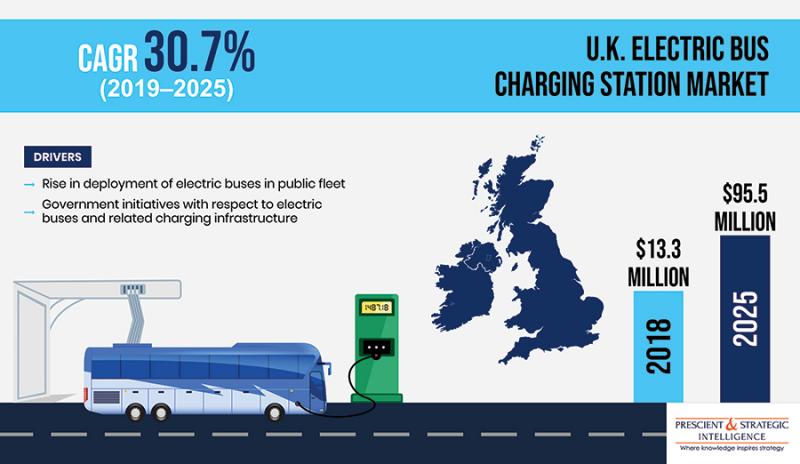In June 2018, BYD Co. Ltd. (BYD) received an order for 37 BYD-ADL Enviro400EV double-decker electric buses from Transport for London (TFL); the company delivered the first five in July 2019. In all, 2018 saw the procurement of over 130 electric buses in the U.K., which was a massive increase of 55% from the last year, and by year-end, 300 such automobiles were operational in the kingdom. Considering such an increase, P&S Intelligence has forecast the U.K. electric bus charging station market to grow from $13.3 million in 2018 to $95.5 million by 2025, at an explosive 30.7% CAGR between 2019 and 2025.

The EVSE comes in a range of power outputs, including <50 kilowatts (kW), 50–150 kW, and >150 kW. Among these, <50 kW electric bus charging stations have found the widest adoption in the kingdom till now, as they are cost-effective. However, they charge the buses rather slowly, which can be problematic for transit companies. Since buses need to operate for long hours in order for transit firms to make money, grounding them for slow charging can be counterproductive. This is why the installation of >150 kW charging stations is set to rise massively in the coming years.
However, the most important reason behind the advance of the U.K. electric bus charging station market is the rise in the sale of electric buses. Diesel buses, just like any other internal combustion engine (ICE) automobile, lead to heavy emissions of greenhouse gases (GHGs), which are notorious for polluting the air and causing breathing-related diseases. Moreover, the heavy consumption of diesel is leading to the depletion of crude oil resources, which is why replacing conventional buses with clean-energy variants has become necessary.
To receive free sample pages of this report@ https://www.psmarketresearch.com/market-analysis/uk-electric-bus-charging-station-market/report-sample
As a conventional automobile cannot work without gasoline or diesel, EVs cannot work without electricity. And, the lack of charging stations around the world has been one of the biggest factors discouraging people from purchasing EVs. This is why the installation of EVSE has picked up pace in the kingdom, with governments, automakers, and utility companies coming together to achieve the objective. For instance, InvertedPower Pty. Ltd. and Heliox B.V. began collaborating in June 2019 to install SprintCharge, a battery-buffered electric bus charging station.
Hence, as more electric buses are procured in the U.K., the number of charging stations is bound to go up.